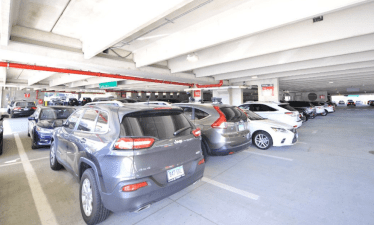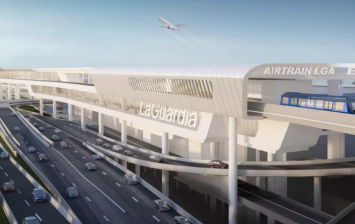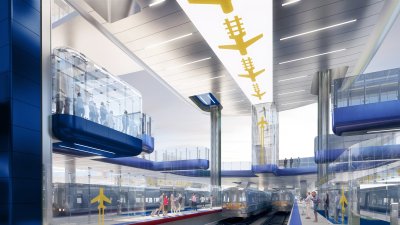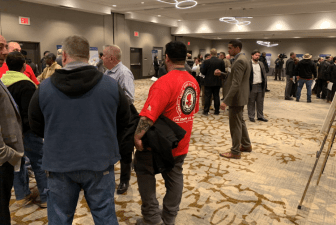Report: ‘Wrong Way’ AirTrain Would Be the Most Costly, Least Necessary Transit Project Ever
A watchdog group takes issue with the Port Authority's ridership estimates, claiming that the people mover would be 'nearly twice as expensive as the Second Avenue Subway'
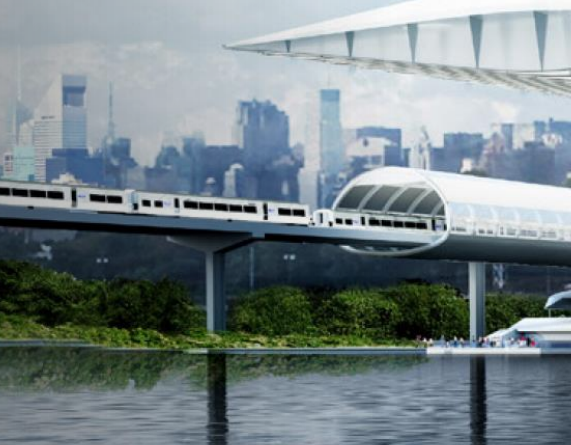
The LaGuardia AirTrain, long regarded by many as a boondoggle, is threatening to overtake the Second Avenue Subway as the world’s most expensive transit project per rider, according to a new report.
The report, by the watchdog group Reinvent Albany, seeks to refute the Port Authority of New York and New Jersey’s contentions that the little-loved project will remove 4,000 cars daily from local roads, making it “an investment in a greener planet,” as Port Authority Executive Director Rick Cotton wrote in Streetsblog. And it reinforced a 2020 Streetsblog analysis, “LGA AirTrain is Andrew Cuomo’s $2B Parking Lot,” that determined that the AirTrain is “almost entirely driven by the needs of car drivers, not transit users.”
“A large part of what the LGA AirTrain does is provide an extremely expensive shuttle service for airport employees parking their cars, long-term parkers, rental-car customers and taxi drop-offs traveling from Willets Point to the LGA terminals,” the report’s authors wrote. “As such, the LGA project is more about making it easier to drive and park at LaGuardia than creating a superior transit option. Accordingly, we think the Port Authority’s claim that the AirTrain is climate friendly is completely bizarre.”
The AirTrain, which got the green light from the Federal Aviation Administration in July, is an automated people mover that will run for a mile and a half between the airport and Long Island Rail Road station at Willets Point, along the Grand Central Parkway and the Flushing Bay promenade. The project’s chief promoters were former Gov. Cuomo and a consortium of local construction and business interests that figured prominently among Cuomo’s donors, who hailed the AirTrain as an economic engine and a jobs program.
But it early on gained a variety of foes. Some critics complained that its “wrong way” route wouldn’t save people time, because it sends travelers further east from LaGuardia — and to a less-useful LIRR line — before doubling back toward the airport. Transit advocates pointed out that it’s a mistake to spend so much on a project that adds so little to the city’s transportation network. Environmentalists charged that the AirTrain would endanger the shoreline of Flushing Bay. The editorial boards of the Daily News and the New York Post, which seldom agree, faulted its costs.
Indeed, the report’s most explosive claims are about the AirTrain costs — which ballooned from an initial estimate of $500 million in 2015 to more than $2 billion today — would render it almost twice as costly than the Second Avenue Subway, on a per-ride basis, which the authors estimate are “fewer than 6,000 net transit trips a day.” (The Second Avenue Subway, an essential transit project decades in the making, had tremendous cost overruns that made it the most expensive subway yet built.)
They arrive at that number by taking the figure from the federal document authorizing the AirTrain, the Final Environmental Impact Statement, which estimates that, by 2026, the AirTrain would carry a total of 13,118 daily riders: 9,173 air passengers and 3,945 airport employees.
“[T]he FEIS clearly shows that automobile trips to the train by airport employees parking at Willets Point and taxis and private cars dropping off passengers, are a big share of all AirTrain riders,” they wrote, adding, “Therefore, we calculate $2.05B project cost [divided by] 6,000 net daily riders equals $346,000 per AirTrain rider — nearly twice as expensive as the Second Avenue Subway.”
Reinvent Albany says the 13,000-plus daily rider claim is “overstated” because the FEIS projects that 1,252 daily AirTrain air passengers will arrive at the AirTrain by car, either dropped by private car or by various kinds of taxi services. The Port Authority’s assessment that 2,295 airport employees will park private cars in Willets Point and use the AirTrain for a last stage of their commutes reduces that number further.
“These 3,547 riders will still represent car trips on streets and highways, just moved from LaGuardia to nearby segments of the street and highway systems,” the report states. Moreover, it says, the Port Authority’s 2018 ridership survey — an underlying document used to justify the AirTrain — “also indicates that access to the airport by bus and bus+subway trips will decline by 2,238 air passengers and 1,407 employees in 2025 if the AirTrain is built. These should be also subtracted from a net transit-access analysis of the AirTrain plan.”
AirTrain critics said that the report’s analysis demonstrated the lack of necessity of the project and called for its halt.
“Reinvent Albany really nailed this one,” said Ben Kabak, a transit analyst who blogs at Second Ave. Sagas. “The AirTrain is a huge expense, serving very few people while failing to get cars off the road or improve transit connections through underserved parts of Queens. The environmental assessment were fatally flawed at the request of then-Gov. Cuomo, and Gov. Hochul should halt work on the project until a better transit-oriented design is on the table.”
The Port Authority responded that the report is nonsense.
“The ridership numbers presented by Reinvent NY [sic] are breathtakingly wrong,” spokeswoman Amber Greene said in a statement. “They use a ridership level that is literally one-fifth of the 10 million annual riders projected based on passenger surveys. And further, they have taken a 50-year capital investment and divided it by just one year of their underestimated ridership. The life of the AirTrain will be 50 years. Over that period the capital cost per rider would be $5 or less. At this time of climate crisis, rail mass-transit access is an essential 21st century component of a 21st century airport.
“Air Train to LaGuardia will create far-reaching benefits and will attract robust ridership, just as AirTrain JFK has done in the 17 years since it was launched. AirTrain JFK has exhibited steady annual ridership growth that exceeded our projections by 50 percent in 2019,” she added.
